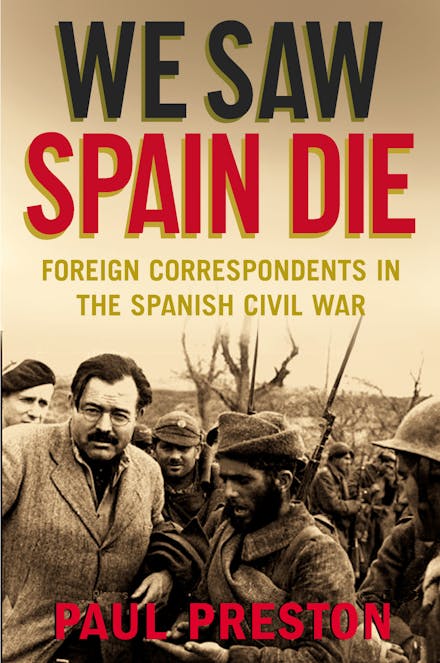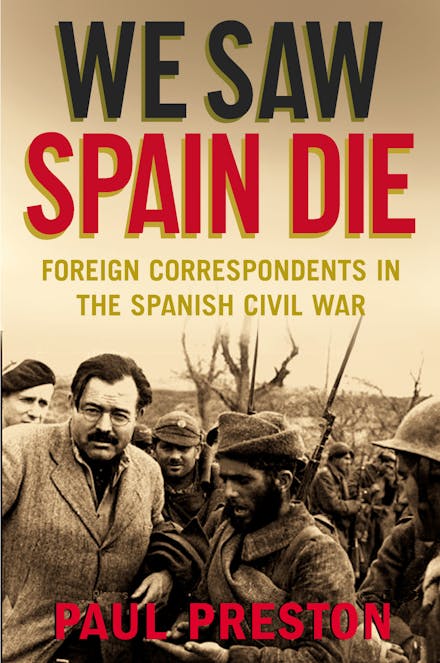Imprint
- Constable
- Constable
Prose: non-fiction, European history, 20th century history: c 1900 to c 2000
We Saw Spain Die is about the courage and the skill of the men and women who wrote about what was happening in Spain during the Civil War, by the world's leading authority.
The war in Spain and those who wrote at first hand of its horrors. From 1936 to 1939 the eyes of the world were fixed on the devastating Spanish conflict that drew both professional war correspondents and great writers. Ernest Hemingway, John Dos Passos, Josephine Herbst, Martha Gellhorn, W. H. Auden, Stephen Spender, Kim Philby, George Orwell, Arthur Koestler, Cyril Connolly, Andre Malraux, Antoine de Saint Exupery and others wrote eloquently about the horrors they saw at first hand.
Together with many great and now largely forgotten journalists, they put their lives on the line, discarding professionally dispassionate approaches and keenly espousing the cause of the partisans. Facing censorship, they fought to expose the complacency with which the decision-makers of the West were appeasing Hitler and Mussolini. Many campaigned for the lifting of non-intervention, revealing the extent to which the Spanish Republic had been betrayed. Peter Preston's exhilarating account illuminates the moment when war correspondence came of age.
Praise for We Saw Spain Die: Foreign Correspondents in the Spanish Civil War
-
Excellent...a splendid monument to scholarship. Always absorbing, frequently moving...it fills a crucial gap in the historiography of the Spanish civil war. - The Sunday Times
-
I cannot commend it enough. The story of those who fought to tell the story, at risk to their own lives and against the natural grain of their readers, is a cracker of a subject. [Preston] unpicks the tangles of lies, allegations and half-truths; revives reputations that have unjustly faded; and presents us with an overview that is lucid, unhurried and fresh to read - Daily Telegraph
-
A pioneering investigation of those foreign correspondents who did so much to influence world opinion at the time ... Preston sweeps the reader along with the lucidity of his prose, his passionate commitment to the subject, and, above all, his concern to rescue the reputations of those unjustly neglected and courageous figures who worked alongside far more famous names such as Hemingway, Dos Passos, Kim Philby and Martha Gellhorn. - Literary Review
-
Paul Preston has become a hugely influential historian of the Spanish Civil War, not only for his scholarship, but for his eye for detail and skill as a storyteller. In We Saw Spain Die these talents come to the fore, aided not only by the richness of the material, but also Preston's deep enthusiasm for his subject.
-
- New Statesman
-
This testament to their testimony could not have been supplied by a more erudite expert. Preston is a peerless historian of Spain, and the only one who writes as readably as a professional journalist - Independent
-
A work of impressive scholarship. - BBC History Magazine
-
What marks out his work is not just an understanding of the period ... but also an ability to choose an angle from which to make old history seem new. - The Herald
-
There is much to inspire in the courage and commitment of these journalists and Preston has done us proud in telling their stories - Morning Star

Paul Preston
Paul Preston is regarded as the leading historian of twentieth-century Spain alive today. Among his many works are The Triumph of Democracy in Spain (1986), Franco: A Biography (1993), A Concise History of the Spanish Civil War (1996), Comrades (1999), Doves of War: Four Women in Spain (2002) and Juan Carlos (2004). He is PrA ncipe de Asturias Professor of Contemporary Spanish History and Director of the CaA ada Blanch Centre of Contemporary Spanish Studies at the London School of Economics.

























.png?auto=compress&w=150&h=60&fit=crop&fm=jpg)
.png?auto=compress&w=150&h=60&fit=crop&fm=jpg)




